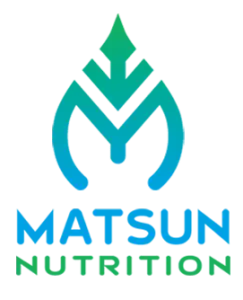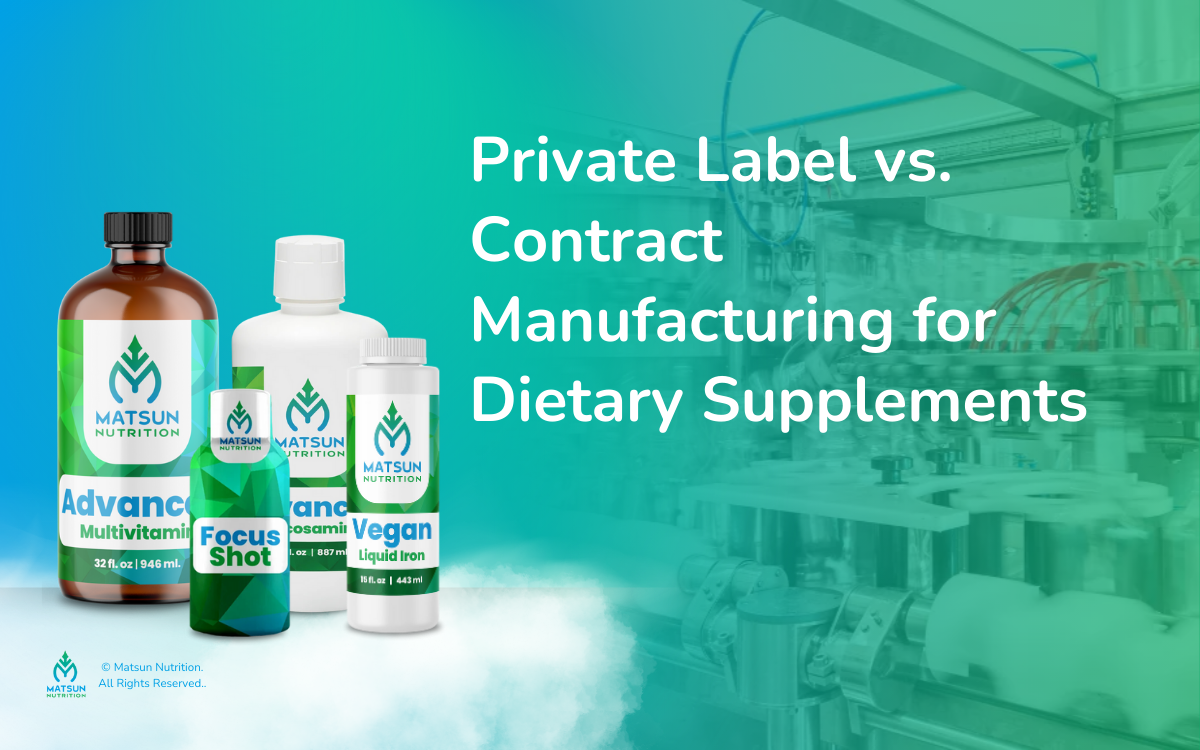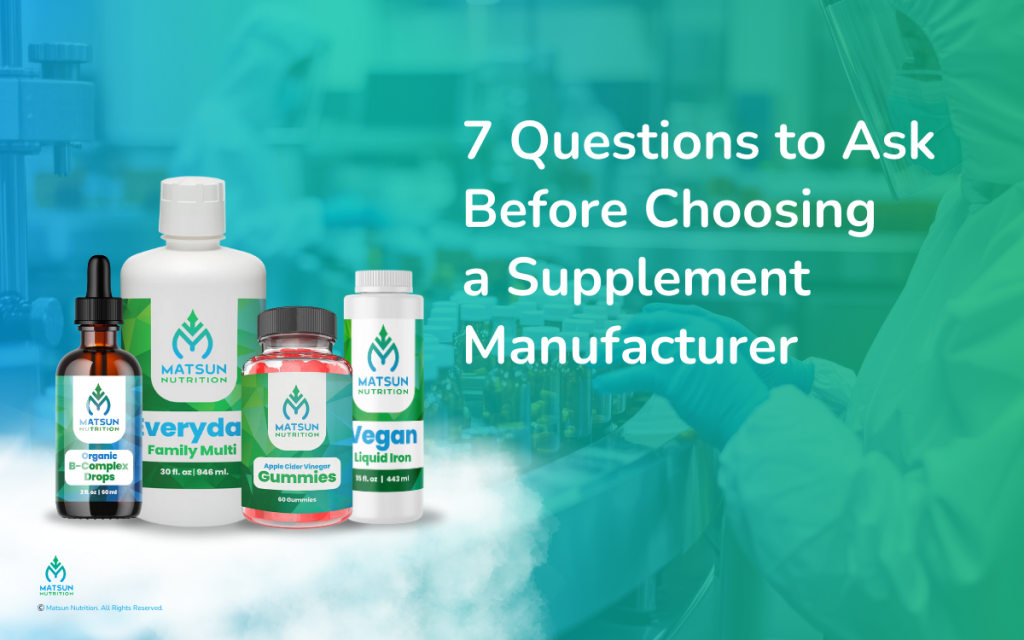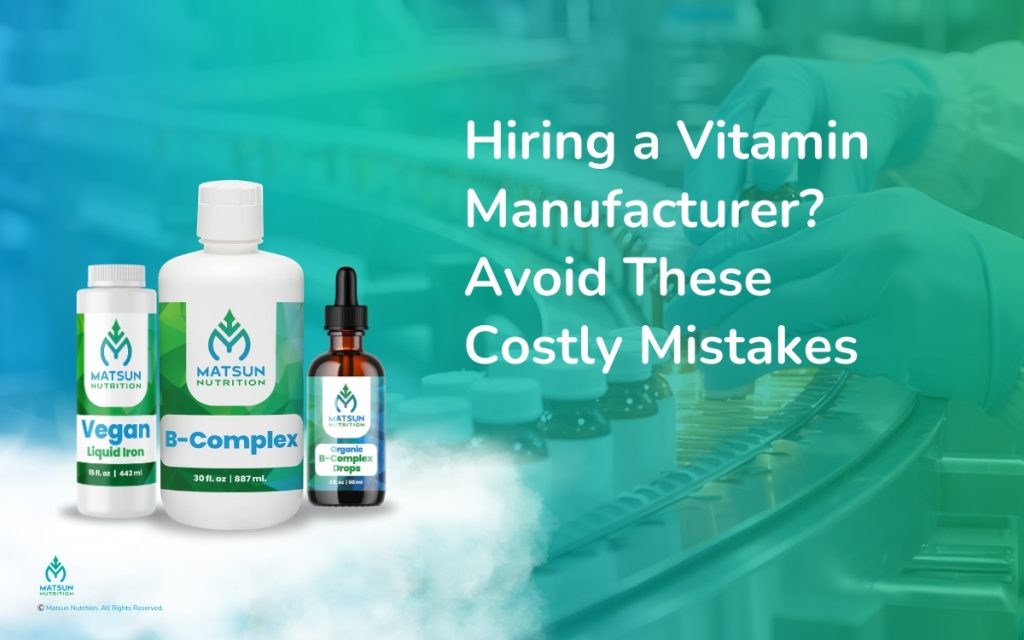Dietary supplements are a lifesaver, and for many, private label supplements make them more accessible than ever. According to a 2023 CRN Consumer Survey on Dietary Supplements, these products play a vital role in people’s lives, with around 74% of adults regularly taking dietary fiber and over 55% qualifying as consistent users. Understanding the distinction between private label vs contract manufacturing is crucial for businesses looking to capitalize on this growing demand.
By working with contract manufacturing supplements providers, companies can offer a range of options to help people fill nutritional gaps, especially when meeting the recommended daily intake of fruits and vegetables feels out of reach.
If you want to build and sell your supplements but can’t figure out the difference between a private label supplement manufacturing and contract manufacturing, there is no need to worry, as we’ve got you sorted. Technically, these services are the same. The only difference is the process. The private label refers to the play and plug option, where an individual picks an existing product from a company and then puts your name on it.
On the other hand, contract manufacturing refers to a do-it-yourself option, where one should figure out every component in the product, including packaging, with assistance from the company. Read on to see what each represents and the primary key differences.

What Is Private-Label Manufacturing?
Private labeling allows brands to outsource and manufacture a product by a third party. Therefore, with this format, an individual might only apply the name to a specific package when selling the product. Although many consumers hardly know this information, it is one of the most common practices in today’s shopping world.
For instance, Private label supplement manufacturers go through customization, including formulation, packaging, and designing, to ensure it matches your target market and the company’s identity. Therefore, working with a private-label supplement manufacturer is the ideal way of navigating the market and making sure the customers get a wide range of products tailored to their needs.
What is Contract Manufacturing?
Supplement Contract Manufacturing involves getting a manufacturer to handle the company’s production process. It assists businesses in saving money, getting access to more resources, and producing lots of goods.
Should you get a contract manufacturing supplements deal, the company takes part in different stages of production, including shipping and manufacturing, depending on the client’s needs. Most contact manufacturers have International Organization for Standardization (ISO) certification, ensuring the firm follows the correct standards.

Private Label Vs Contract Manufacturing - Key Difference
When producing products such as dietary supplements, the goal should be to choose between private label and contract manufacturing. This is a critical aspect in manufacturing, just like the product. However, each model offers some advantages and disadvantages, as listed below.
Customization Options
Contract manufacturing offers the greatest customization options, ensuring that firms can create dietary supplements that match their vision. On the other hand, private label manufacturing focuses more on design and branding instead of marking the dietary supplement features, making it slightly restrictive.
Cost Considerations
Private label manufacturing has lower upfront costs, unlike contract manufacturing. With contract manufacturing, you might have to spend lots of money on the initial investment since it offers you a unique and different product getting into the market.
Best Fit by Brand Type
An established brand would settle for contract manufacturing thanks to its ability to develop unique products that help the team make a mark in the market. However, startups usually pick private label manufacturing since it has cheaper rates and it is easy for the company to get into the market.
Marketing and Advertisement Approaches
Promotions play a critical role in the marketing technique. Therefore, companies that use private label manufacturing hardly spend time and money promoting their dietary supplements, for instance, and avoid extensive marketing techniques.
Contract manufacturing adopts a detailed and extensive promotion technique, including social media channels, website promotions, and other media channels, including newspapers.
Benefits Of Private Label Programs
These are some of the benefits of running a private-label manufacturing model for dietary supplements:
Lower Production Costs
Cost is one of the contributing factors when manufacturing and selling goods. Hence, most companies adopt a private label strategy due to its cost-effectiveness for customers and businesses, thus increasing profits.
High Adaptability
The contract that most private label manufacturing companies have given them a wide range of materials for manufacturing. They also have a lot of factory equipment for different dietary supplement production. The flexibility ensures that a company can test one of the supplements before investing.
Market Stability
There is a reduced comparative price for private labels; thus, customers will most likely get the supplements during the economic crisis. Private label manufacturing offers stability since every store’s number of dietary supplement products indicates how fast the company can replace its products.
Benefits Of Contract Manufacturing Programs
Lots of business owners hate the manufacturing process. Their goal is to simplify the design, which cuts down on cost. A contract manufacturer makes the process fast and smooth. Here are some of the advantages:
High-Quality Products
Contract manufacturers often employ highly skilled and experienced teams who specialize in dietary supplement production. These experts ensure that each product meets stringent quality standards, which is crucial in a highly regulated industry.
With access to advanced equipment, research and development (R&D) resources, and rigorous quality control procedures, contract manufacturers can deliver supplements that not only meet safety and efficacy standards but also have an appealing look and feel.
For businesses, this means a dependable partner in producing high-quality, market-ready products that align with both regulatory and customer expectations.
Reduced Overhead and Optimized Return
When a company outsources production to a contract manufacturer, it eliminates the need to invest in manufacturing facilities, specialized equipment, and operational staff. This reduction in overhead can lead to significant cost savings.
Moreover, contract manufacturers already have established supplier networks, allowing them to source raw materials at competitive prices. This bulk purchasing power enables cost reductions that individual companies may not achieve on their own.
Efficient Scalability
Contact manufacturers to negotiate competitive prices on bulk raw materials that keep the cost of production low. They also maintain a detailed account of your manufacturing preferences, ensuring that an individual can quickly scale output either up or down.

Which Option Is Best For Your Business?
Contract manufacturing and private label manufacturing offer unique benefits for your product. The goal is to look at the originality and scalability of your items when deciding which option best suits your firm.
If you are startup and inspiring supplement brand and wish to grow with minimum investment. Try connect with Low MOQs Supplement Manufacturer. Matsun Nutrition helps brand with low MOQs supplements manufacturing and support listing and supplement selling on amazon marketplace as well.
Researching all the possible partners will assist in knowing about the pricing, expenses, and capabilities. There are a few questions that can guide you in making the right decision which are:How Different Is Your Product From Others?
If it’s pretty unique, using a private label manufacturer is the best way to tweak an existing product and reduce costs. Whether you need supplement packaging for your liquid supplements or need other services, understanding your product will make it easy to have a unique product in the market and how to present it. However, investing in complete product research, development, and resting requires a contract manufacturer if the product is new.
Which Factors Will Affect Your ROI?
There are many, including shipping disruptions, manufacturing costs, and economic fluctuations. With private label manufacturers, you will most likely develop a relationship with the suppliers. However, contract manufacturing is affected by third-party supply chain delays.
Private-Label Manufacturing For Dietary Supplements
The dietary supplement market continues to grow, estimated to reach $327.42 billion by 2030, thanks to consumer awareness and interest in wellness and health. Most desire increased energy, weight management, increased nutrition, and improved bone and joint health.
This is why there has been an increase in private-label supplement brands, sometimes souring the pharmaceutical companies. With many supplements in the market, it becomes impossible for consumers to know which products are trustworthy and which aren’t. However, with branded products, clinically supported benefits are well communicated to the consumer, thus justifying its higher pricing.
Therefore, leveraging private-label dietary supplement formulas is an incredible way of launching your items in the market. Here are steps on how you can start your private-label dietary supplement brand:
- Know your brand: Understand which characteristics define it, including whether you want your product to be organic or vegan, targeting men, women, or both.
- Create an image: You want the brand to carry the tone on your socials, stores, and website, so have a logo.
- Plan on the selling option: Determine the best way to reach your target audience. After deciding where to sell your products, find out which ideas and resources are necessary since that will help select your private label manufacturing company.
Pick a high-quality private-label supplement manufacturer: One of the main reasons people opt for manufacturer A and not B is what they are producing. Settle for a manufacturer that meets your needs and one you can establish a close connection with for a long-term commitment.
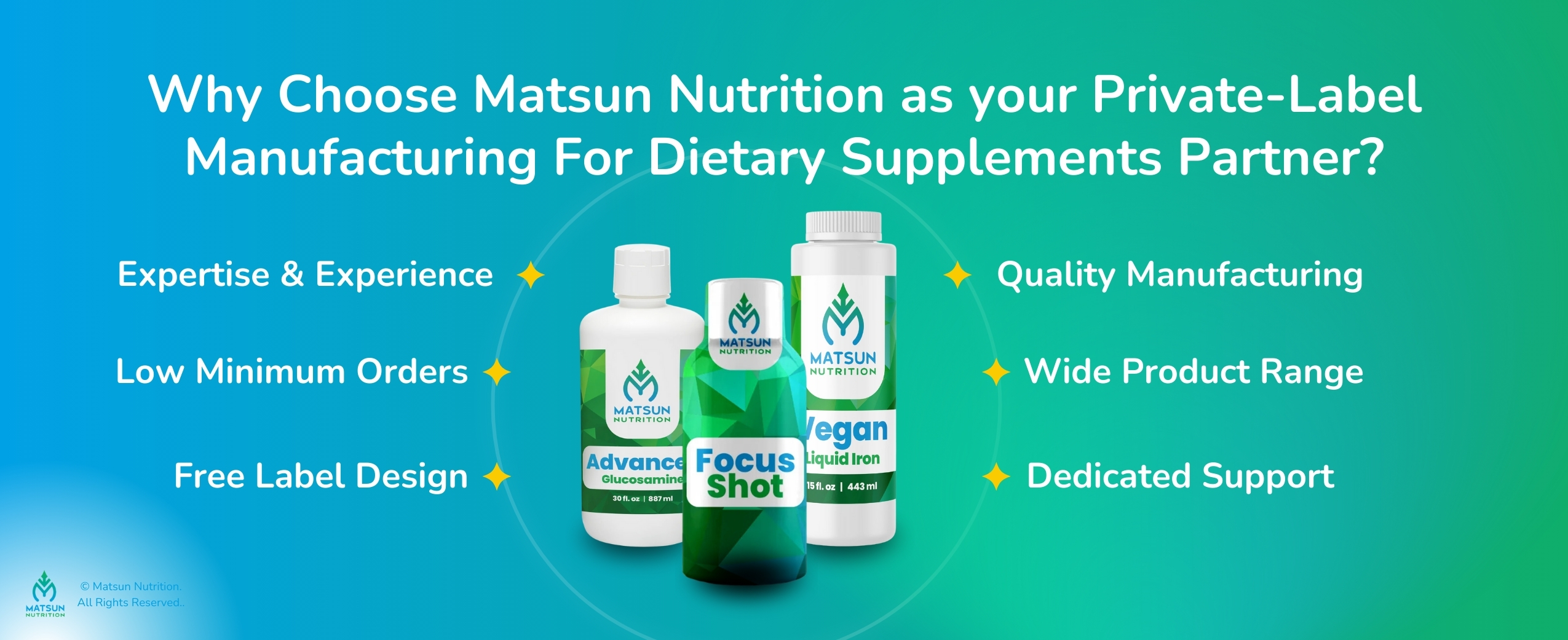
Focus On Finding The Proper Manufacturer For Your Dietary Supplements
Not every manufacturer you come across will fit into your checklist, but this post should come in handy the next time you find yourself confused about which option best services your needs. A supplement contract manufacturing company offers customization options, which is sometimes the best choice for big companies.
However, a private label manufacturing option also works well for small firms, especially those needing their products to enter the market quickly. Therefore, the choice is yours!
At Matsun Nutrition, we provide label designs for private label orders. Contact our team today to learn more about our supplement label designs.
FAQs
It is a must for a dietary supplement disclaimer to be on the dietary supplement label and have added nutritional value. However, with food, one needs a dietary facts panel list with the nutrients, minerals, and vitamins in it.
Some joint supplements include minerals such as iron, magnesium, and calcium. Vitamins also fall in this category and often have vitamin D, biotin, multivitamins, and more.
FDA doesn’t approve any dietary supplements since it doesn’t approve foods. The FDA only looks closely at manufacturing and labeling to ensure that the companies comply with the set rules and regulations.
Companies can only comply with FDA rules and regulations with proper labels. That includes the correct name of the product, its net quality contents, the name and address of the manufacturer or distributor, and how to use the product.
